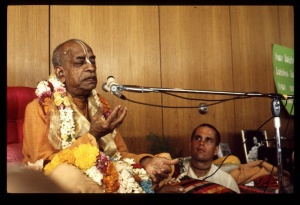SB 1.19.1 (1965): Difference between revisions
(Created page with "<div style="float:left">link=SB (1965) Nineteenth Chapter - Appearance of Sukadeva Goswami '''[[SB (1965) Nineteenth Chapter - Appearance of Sukadeva ...") |
(Vanibot #0020: VersionCompareLinker - added a link to the Version Compare feature) |
||
| Line 1: | Line 1: | ||
[[Category:Srimad-Bhagavatam (1962-1965) - Canto 01 Chapter 19|s01]] | |||
<div style="float:left">[[File:Go-previous.png|link=SB (1965) Nineteenth Chapter - Appearance of Sukadeva Goswami]] '''[[SB (1965) Nineteenth Chapter - Appearance of Sukadeva Goswami]]'''</div> | <div style="float:left">[[File:Go-previous.png|link=SB (1965) Nineteenth Chapter - Appearance of Sukadeva Goswami]] '''[[SB (1965) Nineteenth Chapter - Appearance of Sukadeva Goswami]]'''</div> | ||
<div style="float:right">[[File:Go-previous.png|link=SB 1.18.50 (1965)]] '''[[SB 1.18.50 (1965)]] - [[SB 1.19.2 (1965)]]''' [[File:Go-next.png|link=SB 1.19.2 (1965)]]</div> | <div style="float:right">[[File:Go-previous.png|link=SB 1.18.50 (1965)]] '''[[SB 1.18.50 (1965)]] - [[SB 1.19.2 (1965)]]''' [[File:Go-next.png|link=SB 1.19.2 (1965)]]</div> | ||
{{CompareVersions|SB|1.19.1|SB 1965|SB 1972-77}} | |||
{{RandomImage}} | {{RandomImage}} | ||
| Line 6: | Line 8: | ||
==== TEXT No. 1 ==== | ==== TEXT No. 1 ==== | ||
<div | <div class="SB65verse"> | ||
Suta Uvacha: | |||
Mahipatis tu atha tat karma garhyam | |||
Vichintayan atmakritam sudurmanah. | |||
Aho maya neecha anarya vat kritam | |||
Niragasi brahmani gudha tejasi. | |||
</div> | </div> | ||
| Line 17: | Line 19: | ||
==== ENGLISH SYNONYMS ==== | ==== ENGLISH SYNONYMS ==== | ||
<div | <div class="synonyms"> | ||
Mahipati—the king, Tu—but, Atha—thus (while coming back home), Tat—that, Karma—act, Garhyam—abominable, Vichintayan—thus thinking, Atmakritam—done by himself, Sudurmanah—very much depressed, Aho—alas, Maya—by me, Neecha—heinous, Anarya—uncivilised, Vat—like, Kritam—done, Niragasi—unto one who is faultless, Brahmani—unto a Brahmin, Gudha—grave, Tejasi—unto the powerful. | Mahipati—the king, Tu—but, Atha—thus (while coming back home), Tat—that, Karma—act, Garhyam—abominable, Vichintayan—thus thinking, Atmakritam—done by himself, Sudurmanah—very much depressed, Aho—alas, Maya—by me, Neecha—heinous, Anarya—uncivilised, Vat—like, Kritam—done, Niragasi—unto one who is faultless, Brahmani—unto a Brahmin, Gudha—grave, Tejasi—unto the powerful. | ||
</div> | </div> | ||
| Line 24: | Line 26: | ||
==== TRANSLATION ==== | ==== TRANSLATION ==== | ||
<div | <div class="translation"> | ||
Thus while coming back to his home the king felt within himself that the act, done by him on the faultless Brahmin who was gravely powerful, was heinous and uncivilized and thus he was distressed within himself. | Thus while coming back to his home the king felt within himself that the act, done by him on the faultless Brahmin who was gravely powerful, was heinous and uncivilized and thus he was distressed within himself. | ||
</div> | </div> | ||
| Line 31: | Line 33: | ||
==== PURPORT ==== | ==== PURPORT ==== | ||
<div | <div class="purport"> | ||
The pious king regretted the accidental improper action done by him on the gravely powerful Brahmin who was faultless. Such repentance is natural for a good man like the king and such repentance only delivers a devotee from all kinds of sins accidentally committed by the devotee. The devotees are naturally faultless. Accidental fault committed by a devotee is sincerely regretted and by the Grace of the Lord, all sins unwillingly committed by a devotee, are burnt into ashes in the fire of repentance. | The pious king regretted the accidental improper action done by him on the gravely powerful Brahmin who was faultless. Such repentance is natural for a good man like the king and such repentance only delivers a devotee from all kinds of sins accidentally committed by the devotee. The devotees are naturally faultless. Accidental fault committed by a devotee is sincerely regretted and by the Grace of the Lord, all sins unwillingly committed by a devotee, are burnt into ashes in the fire of repentance. | ||
</div> | </div> | ||
| Line 39: | Line 41: | ||
<div style="float:right">[[File:Go-previous.png|link=SB 1.18.50 (1965)]] '''[[SB 1.18.50 (1965)]] - [[SB 1.19.2 (1965)]]''' [[File:Go-next.png|link=SB 1.19.2 (1965)]]</div> | <div style="float:right">[[File:Go-previous.png|link=SB 1.18.50 (1965)]] '''[[SB 1.18.50 (1965)]] - [[SB 1.19.2 (1965)]]''' [[File:Go-next.png|link=SB 1.19.2 (1965)]]</div> | ||
__NOTOC__ | __NOTOC__ | ||
__NOEDITSECTION__ | |||
Latest revision as of 10:30, 25 May 2020

A.C. Bhaktivedanta Swami Prabhupada
TEXT No. 1
Suta Uvacha: Mahipatis tu atha tat karma garhyam Vichintayan atmakritam sudurmanah. Aho maya neecha anarya vat kritam Niragasi brahmani gudha tejasi.
ENGLISH SYNONYMS
Mahipati—the king, Tu—but, Atha—thus (while coming back home), Tat—that, Karma—act, Garhyam—abominable, Vichintayan—thus thinking, Atmakritam—done by himself, Sudurmanah—very much depressed, Aho—alas, Maya—by me, Neecha—heinous, Anarya—uncivilised, Vat—like, Kritam—done, Niragasi—unto one who is faultless, Brahmani—unto a Brahmin, Gudha—grave, Tejasi—unto the powerful.
TRANSLATION
Thus while coming back to his home the king felt within himself that the act, done by him on the faultless Brahmin who was gravely powerful, was heinous and uncivilized and thus he was distressed within himself.
PURPORT
The pious king regretted the accidental improper action done by him on the gravely powerful Brahmin who was faultless. Such repentance is natural for a good man like the king and such repentance only delivers a devotee from all kinds of sins accidentally committed by the devotee. The devotees are naturally faultless. Accidental fault committed by a devotee is sincerely regretted and by the Grace of the Lord, all sins unwillingly committed by a devotee, are burnt into ashes in the fire of repentance.